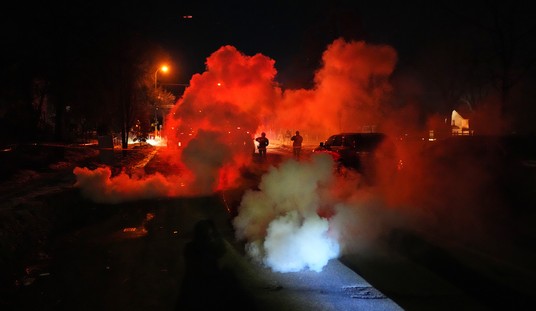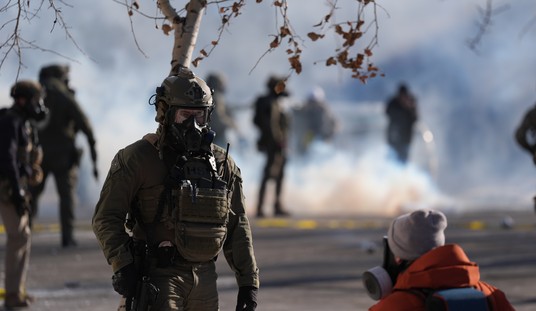The Pax Americana “is a term applied to the historical concept of relative peace in the Western Hemisphere and later the Western world resulting from the preponderance of power enjoyed by the United States beginning around the start of the 20th century.” For nearly three generations the world population has enjoyed a rising standard of living and the absence of general war.
According to administration officials the party’s only just begun. “In September 2010, Secretary of State Hillary Clinton proclaimed a ‘new American Moment’ that would “lay the foundations for lasting American leadership for decades to come.” A year and a half later, President Obama declared in his State of the Union speech: ‘Anyone who tells you that America is in decline . . . doesn’t know what they’re talking about.'”
But not all the signs are reassuring.
Greg Miller at the Washington Post says a panel of administration advisers warned that “inadequate attention [was being paid] to China, the Middle East and other national security flash points” because of a focus on headhunting al-Qaeda leadership with drones. “The classified document called for the first significant shift in intelligence resources since they began flowing heavily toward counterterrorism programs and war zones after the attacks of Sept. 11, 2001.”
This comes as the administration prepared to cut $100 billion from the defense budget. However, the cuts are slated to come “later in the decade”.
“What strategic analysis did they do to come up with the $100 billion figure?” the senior HASC aide told Defense News on Wednesday. “[Joint Chiefs Chairman Gen. Martin] Dempsey testified to us last month that he can’t keep doing what we are doing around the world with additional cuts, so what is the White House proposing they stop doing?”
President Obama, who recently discussed the Iranian nuclear countdown with Prime Minister Netanyahu in Israel is facing further challenges in Southwest Asia — and in the Pacific, Latin America, the Levant and Africa — to name a few places. Where the resources will be found to defend against terrorism and cover the blind spots is problematic.
China has expanded its assistance to the Pakistani nuclear program reaching “a formal agreement last month to construct a third nuclear reactor at Chashma that the Obama administration says will violate Beijing’s promises under an international anti-nuclear weapons accord.”
Additionally, recent U.S. intelligence reports indicate that China, which supplied Pakistan with nuclear weapons design data and technology, is in the process of modernizing Islamabad’s nuclear arsenal, which is estimated to contain as many as 110 warheads.
The arms cooperation is said to include development of a new warhead for Pakistan’s growing missile arsenal as well as assistance in reprocessing spent nuclear fuel.
The increase in Pakistani nuclear stockpiles has not stopped President Obama from reducing those of the United States. The Jon Kyle at the Wall Street Journal writes “America’s Nuclear Deterrent—and Defenses—Are Eroding Fast”.
What is the status of missile defense and the nuclear weapons that remain the foundation of the U.S. strategic deterrent? Sadly, despite great scientific and technological success, both programs are in jeopardy. Neither is likely to fare well under President Obama, who advocates “nuclear zero” and is no fan of missile defense. The president is on course to systematically reduce America’s capabilities in both areas despite specific commitments he made while securing bipartisan support for the 2010 New Strategic Arms Limitation Treaty with Russia.
Even the ballyhooed construction of interceptors to guard against North Korea turns out to be sleight of hand. To balance the tough stance against North Korea, the administration has weakened its position towards Russia and Iran. The Editorial Board of the Washington Post has summarized the state of play:
Defense Secretary Chuck Hagel … announce[d] that the administration would add 14 interceptors to an anti-missile base in Alaska and deploy a new radar in Japan. The deployment, which essentially reversed a decision by President Obama to freeze the Alaska system, was prompted by North Korea’s progress toward building intercontinental ballistic missiles that could reach the United States, as well as its recent nuclear test. …
That was a good decision. But missed in some of the subsequent stories was the other shoe: The Pentagon is canceling the planned fourth phase of an anti-missile system that had been scheduled for deployment in Poland in 2022. The SM3 IIb missile was significant for two reasons: It was the only interceptor planned for the Europe-based system that could have defended the United States against an attack from Iran; and it was the component of the system most decried by Russia, which claimed that it could be used against its intercontinental missiles.
Defenses are shrinking while the threat level nearly everywhere is growing. All that is left is to scrape a smaller and smaller amount of butter over an ever larger piece of toast.
That could be problematic as the administration prepares to push harder against Syria. Foreign Policy says a consensus is emerging on both sides of the aisle to take a tougher stand against Syria, partly out concern over the fate of its chemical and biological weapons, which may fall into hostile hands.
But the Obama administration has shied away from taking on Syria, not only out of fears of arming al-Qaeda related jihadis in the region but because it would take him directly into conflict with Iran according to Lee Smith at the Weekly Standard.
With so many now arguing for a forward-leaning Syria policy, is it possible that the president alone is incapable of seeing the matter in strategic terms?…
No, if Obama does see the Syrian conflict strategically, perhaps the reason he is not taking a more active position is because he fears that it will anger Iran. It doesn’t matter whether the administration’s negotiating team really believes there’s a deal to be had with Iran, or if Obama simply wants to keep the Iranians at the table for appearance’s sake, it seems he doesn’t want to get the Iranians mad by backing Assad’s adversaries.
Obama came to office in the belief that there was a deal to be had with Iran. There is nothing to indicate he’s changed his mind—even as Iran’s Supreme Leader Ali Khamenei says he is not optimistic. “Our past experiences show that talks for the American officials do not mean for us to sit down and reach a logical solution,” Khamenei said recently. “What they mean by talks is that we sit down and talk until Iran accepts their viewpoint.”
The president has bet that he could talk his way out of trouble and apply the peace dividend to increases in domestic spending. That was the plan. Because after all he’s smart. He can juggle any number of balls in the air at the same time. But what if it doesn’t work?
The net result of these defense reductions and threat increases is that the United States faces a metastasizing set of challenges even as it continues to downsize its forces at a rapid rate. President Theodore Roosevelt once counseled “speak softly and carry a big stick.” Today the increasingly available option is “carry a small stick and whistle past the graveyard”.
What happens when a fourth chainsaw is added … and a fifth?
The Three Conjectures at Amazon Kindle for $1.99
Storming the Castle at Amazon Kindle for $3.99
No Way In at Amazon Kindle $8.95, print $9.99










Join the conversation as a VIP Member